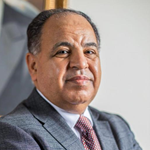Tuesday, Apr 16, 2024 | 04:30 PM - 05:00 PM
Location: Cedar Hall, HQ1-1-660
![]() Click here for the photos
Click here for the photos
OVERVIEW
MCD Director Jihad Azour will have a one-on-one conversation with the Minister of Finance of Egypt to learn about Egypt’s recent policy experience following a series of external shocks and the critical role an integrated package of exchange rate, monetary, fiscal, and structural policies played in restoring macroeconomic stability.
REPORT
Key Points:
Successfully completing the program reviews. The last two years have been very difficult, with internal vulnerabilities exacerbated by successive external shocks. However, Egypt has been committed to reforms to ensure the success of the Fund program and its ongoing reviews and to support economic recovery and growth. These include close policy coordination to bring inflation back to target, allowing interest rates to gradually decrease, creating fiscal space for targeted social spending, and enhancing the role of the private sector.
Egypt’s private sector role. Egypt’s private sector will play a leading role in economic recovery and job creation. The Egyptian authorities are leveling the playing field, through tax and customs reforms, to ensure a competitive environment for private entrants. In addition, the state footprint is being gradually reduced through a well-designed roadmap, including an Initial Public Offering (IPO) program for state entities expected to be completed within the next five years. The private sector is expected to significantly support job creation and run enterprises previously owned by the state in a more efficient and productive manner.
Quotes:
“The financial situation has improved, and the positive sentiment has become predominant.” Jihad Azour (13:09)
Blurb:
How has Egypt juggled successive shocks and overcome many challenges to successfully complete two reviews of the augmented 46-month Extended Fund Facility Fund program? Policy coordination, perseverance, confidence, and reforms are key drivers of success. Expanding the role of the private sector will significantly support job creation and improve efficiency.
Contributor: Najla Nakhle
SPEAKER

Dr. Mohamed Maait
Minister of Finance of Egypt
Dr. Mohamed Maait is currently serving as the Minister of Finance. Prior to his appointment as a Minister, he held the position of Vice Minister of Finance for Public Treasury Affairs & Head of the Economic Justice Unit. In addition, he served as the First Assistant Minister of Finance for Treasury Affairs in 2015 and as the Assistant Minister of Finance for Pensions and Social Insurance during the period (2009 – 2013). He also held the position of the Assistant Minister of Finance for Actuarial Administration Affairs in (2013) and the position of the First Assistant Minister of Health & Population during the period (2014–2015). Over his career of 33 years, he occupied many positions such as acting Chairman and Vice Chairman of the Egyptian Financial Supervisory Authority (2013-2015), Chairman of the Egyptian Governmental Actuarial Department (EGAD) at the Ministry of Finance (2010-2013), Vice Chairman of the National Organization for Social Insurance (2011-2012), and Senior Advisor to the Minister of Finance (2007-2009). He was also appointed as the Executive Director of the Egyptian Insurance Institute (2007). Regarding his presence in boards of directors, he is currently the Chairman of the Board of Directors of the Africa Reinsurance Corporation since 2021, and the Chairman of the Board of Directors of the Egyptian General Authority for Universal Health Insurance since 2018. Moreover, he was appointed as a member of the board of directors in many institutions.
Academically, he holds the title of the Assistant Professor in the Department of Actuarial Science and Insurance in the Faculty of Commerce - Cairo University.He also worked as a senior lecturer and has more than 30 years of teaching and researching experience at many universities in Egypt, Sudan, England and Scotland. Dr. Maait holds a BSc degree in Insurance and Mathematics from Cairo University, Egypt (1984), an MPhil in Insurance from Cairo University, Egypt (1992). He also obtained a Diploma in Actuarial Science in 1996, an MSc in Actuarial Science in 1997, and a PhD degree in Actuarial Science from City University, London, UK (2003). His academic and professional activities were shown in several research papers and publications.
MODERATOR

Dr. Jihad Azour
Director of the Middle East and Central Asia Department
IMF
Mr. Jihad Azour is the Director of the Middle East and Central Asia Department at the International Monetary Fund where he oversees the Fund’s work in the Middle East, North Africa, Central Asia and Caucasus.
Mr. Azour served as Lebanon’s Finance Minister in 2005-08, during which time he coordinated the implementation of important reforms, including modernizing the country’s tax and customs systems. Before and since his time as finance minister, he held a wide range of positions in the private sector, including McKinsey and Booz and Co. where he was a Vice-President and Senior Executive Advisor. Prior to joining the IMF in March 2017, he was a Managing Partner at investment firm Inventis Partners.
Mr. Azour holds a PhD in International Finance and a post-graduate degree in International Economics and Finance, both from the Institut Institut d'Etudes Politiques de Paris. He also did research on emerging economies and their integration into the global economy as a post-doctoral fellow at Harvard. Mr. Azour has published several books and articles on economic and financial issues and taught extensively.